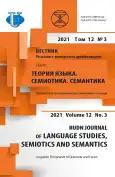«Русский медведь» в испаноязычном медиадискурсе
- Авторы: Клещенко Л.Л.1
-
Учреждения:
- Российский государственный педагогический университет имени А.И. Герцена
- Выпуск: Том 12, № 3 (2021): Лингвистические доминанты грамматики и словаря
- Страницы: 806-822
- Раздел: ДИСКУРСИВНЫЕ ПРАКТИКИ И АНАЛИЗ ТЕКСТА
- URL: https://journal-vniispk.ru/2313-2299/article/view/323367
- DOI: https://doi.org/10.22363/2313-2299-2021-12-3-806-822
- ID: 323367
Цитировать
Полный текст
Аннотация
В статье рассматривается роль «медвежьей» метафоры в испаноязычном политическом дискурсе. Актуальность исследования обусловлена, во-первых, интенсификацией сотрудничества России со странами Латинской Америки, на результативность которого могут оказывать влияние стереотипы и политические символы. Во-вторых, растущей популярностью использования зооморфных метафор средствами массовой информации. Одним из неофициальных символов России, к которому часто обращаются как традиционные СМИ, так и социальные медиа, является медведь. Метафора Россия - медведь в настоящее время широко используется как в российских, так и в зарубежных периодических изданиях, карикатурах. Целью настоящей статьи является выявление специфики репрезентации образа России-медведя в ибероамериканском политическом масс-медийном дискурсе. Источником для анализа является испаноязычный медиадискурс (кейсы: украинский кризис 2014 г., венесуэльский кризис, военная операция России в Сирии, вмешательство России в выборы в Мексике). Научная новизна исследования состоит в том, что впервые в русскоязычной научной литературе рассматриваются особенности использования медвежьей метафоры латиноамериканскими СМИ и социальными медиа. Автор приходит к выводу, что метафора Россия-медведь используется как во внутриполитической символической борьбе, так и во внешнеполитическом дискурсе. Специфика применения «медвежьей» метафоры в Латинской Америке определяется главным образом политическими ориентациями: так, левые традиционно рассматривают Россию как союзника, апеллируя к таким смыслам медвежьей метафоры, как сила, справедливость, способность стать защитником от агрессоров. В свою очередь, их оппоненты привлекают медвежью метафору для маркирования левых политиков как предателей национальных интересов. В данном контексте образ Медведя выполняет функцию символического пограничника. Соответственно, медвежья метафора может использоваться как для создания образа союзника и защитника, так и врага. Ибероамериканские СМИ обращаются к медвежьей метафоре преимущественно в заголовках и подзаголовоках материалов, посвященных российской внешней политике, что позволяет привлечь внимание читателей к рассматриваемой теме.
Об авторах
Людмила Леонидовна Клещенко
Российский государственный педагогический университет имени А.И. Герцена
Автор, ответственный за переписку.
Email: ludmila.popova2011@yandex.ru
ORCID iD: 0000-0002-4172-6583
кандидат политических наук, старший преподаватель кафедры политологии института истории и социальных наук
191186, Российская Федерация, Санкт-Петербург, наб. Реки Мойки, д. 48Список литературы
- Ustinova, O.V. (2018). The representation of Canada in political discourse. RUDN Journal of Language Studies Semiotics and Semantics, 9(1), 136—157. doi: 10.22363/2313-2299-2018-9-1-136-157 (In Russ.).
- Scocozza, C. (2019). El retorno del “Oso” a América Latina. La política rusa en Venezuela. Cultura Latinoamericana, 30(2), 58—73. (In Spanish).
- Rossomakhin, A.A. & Khrustalev, D.G. (2008). Russia as a Bear: The Origins of visualization (XVI—XVIII centuries). In: Borders: Almanac of the Center for Ethnic and National Studies of IVSU. Issue 2: Visualization of the nation. Ivanovo: IVSU. pp. 123—161. (In Russ.).
- Lazari, A. de & Ryabov, O.V. (2008). Russian Bear in Polish satirical graphics of the interwar period (1919—1939). In: Borders: Almanac of the Center for Ethnic and National Studies of IVSU. Issue 2: Visualization of the nation. Ivanovo: IVSU. pp. 162—182. (In Russ.).
- Riabov, O.V. (2009). Hunting the bear: on the role of symbols in the political struggle. Emergency reserve, 1, 195—211. (In Russ.).
- Riabova, T.B. (2012). The bear as a symbol of Russia: the sociological dimension. In: “Russian Bear”: history, semiotics, politics, O.V. Ryabov and A. de Lazari (eds.). Moscow. pp. 338—353. (In Russ.).
- Tsykalov, D.E. (2013). The image of the “Russian bear” in the Russian caricature of the period of the First World War (July 1914—February 1917). Labyrinth. Journal of Social and Humanitarian Studies, 4, 68—80. (In Russ.).
- Riabov, O.V. (2016). Medvezhya metaphor of Russia as a factor of international relations. Cultural linguistics, 10, 315—333. (In Russ.).
- Smirnov, D.G. (2020). The image of the Russian bear in the system of Russian ecosemiotics: the first approximation. Bulletin of the Ivanovo State University. Issue 2 (20). pp. 97—103. (In Russ.).
- Sala, I.G. (2012). Echoes of the bear’s growl: The Russian Empire as a white bear in the Spanish press. “Russian Bear”: history, semiotics, politics. Riabov O., de Lazari A. (ed.), Moscow: Novoe literaturnoe obozrenie. pp. 140—149. (In Russ.).
- Gailite, G. (2013). The Bear and Latvia: images of Latvian-Russian relations in caricature. Labyrinth. Journal of Social and Humanitarian Studies, 4, 29—40. (In Russ.).
- Babkina, V.A. (2017). The bear metaphor in the discourse of German media. Questions of theory and practice, 11—3(77), 60—62. (In Russ.).
- Budaev, E.V. & Chudinov, A.P. (2009). Metaphor in political interdiscourse. Yekaterinburg. (In Russ.).
- Lakoff, J. & Johnson, M. (1990). Metaphors by which we live. Theory of Metaphor, N.D. Arutyunova, M.A. Zhurinskaya (eds.). Moscow: Progress. pp. 387—415. URL: http://www.metaphor.nsu.ru/lacoff_1.htm (accessed: 10.10.2020).
- Musolff, A. (2011). Metaphor in political dialogue. Language and Dialogue, 1(2), 191—206.
- Krivtsova, L.A. (2012). Bear in the post-Soviet art: the semantics and pragmatics of the image. “Russian bear”: history, semiotics, politics. Ed. by: Riabov O., Lazari A. de (ed.), Moscow: Novoe literaturnoe obozrenie. (In Russ.).
- Zernova, E.S. (2020) Linguistic modeling of Russia’s foreign policy image in the media space of Latin America (based on the media of Venezuela, Mexico and Chile). Ancient and New Romania. Issue 25. pp. 42—64. (In Russ.).
- Lakoff, J. (2006) Metaphor and War: A system of metaphors to justify the Gulf War. Modern political Linguistics. ed. by E. V. Budaev, A. P. Chudinov. Yekaterinburg: USPU, pp. 59—71. URL: www.philology.ru/linguistics1/lakoff-06.htm (accessed 10.10.2020). (In Russ.).
Дополнительные файлы









